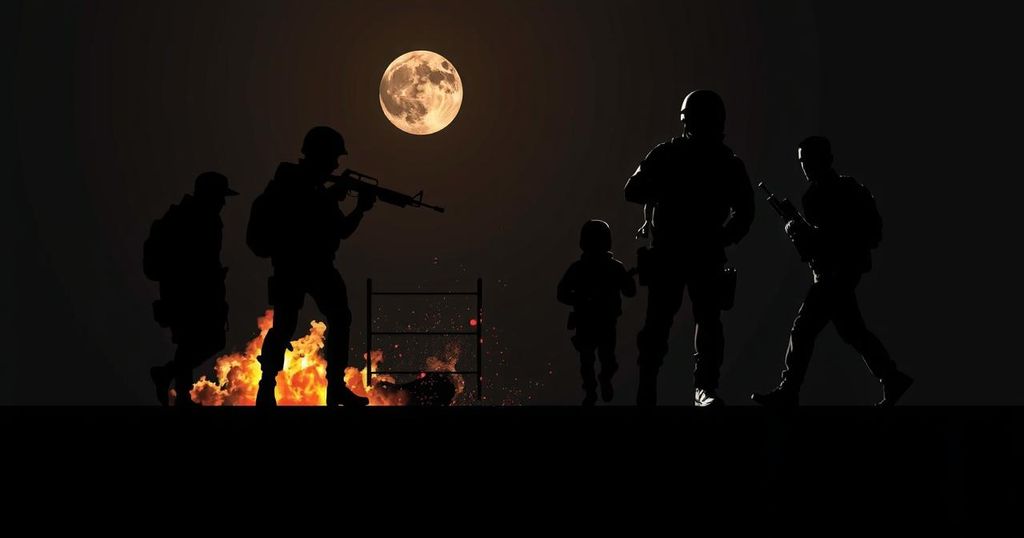Devastating Jihadist Attack in Bamako Raises Security Concerns
A jihadist attack on Bamako, Mali, resulted in a high number of casualties, raising concerns about the junta’s effectiveness in managing a decade-long insurgency. The attack, attributed to the al-Qaida affiliate JNIM, targeted an elite police training academy, led to the closure of the airport, and was marked by significant fatalities and injuries, prompting a humanitarian response disruption from the WFP.
A significant jihadist attack occurred in the Malian capital, Bamako, resulting in numerous fatalities and further complicating the security situation in the region. Reports indicate that the assault targeted various sites, including a prestigious police training facility, and was carried out by the al-Qaida affiliate Jama’a Nusrat ul-Islam wa al-Muslimin (JNIM). The violence prompted the temporary closure of the city’s airport, halting flight operations for the day. Officials acknowledged the occurrence of the attack and confirmed there were casualties; however, they did not provide specific numbers. A source cited by Agence France-Presse detailed that at least 77 individuals were killed and 255 injured, while another confidential government document suggested the death toll could be around 100, including 81 identified victims. Reports further indicated that approximately 50 military police students were buried on Thursday. During the assault, a security official monitoring the training complex reported the apprehension of at least 15 suspects. Additionally, a World Food Programme (WFP) aircraft sustained damage during the incident at the airport, disrupting humanitarian operations in the region. A WFP spokesperson noted the impact on their ability to deliver essential services, stating, “It is not the only plane we use in Mali, but this reduces our humanitarian response capacity to give to civilians.” The ongoing conflict in Mali can be traced back to a 2012 Tuareg rebellion which spiraled into a protracted insurgency against the state, now compounded by the rise of jihadist groups. This turmoil has not only affected Mali but has also escalated violence in the broader Sahel region, heightening concerns regarding stability across West Africa. Notably, over 1,600 civilian casualties were reported in the first nine months of 2023, marking a 17% increase in fatalities compared to the previous year. The attack transpired amidst a new initiative by the Alliance of Sahel States (AES), which includes Mali, Niger, and Burkina Faso, to establish a new passport that will exist outside the purview of the Economic Community of West African States (Ecowas). This development is perceived as a move to solidify AES’s autonomy from Ecowas, which Mali’s ruling junta claims is under undue Western influence. Tensions within Ecowas have escalated following Mali’s military coup in response to the perceived shortcomings of civilian administration to manage the insurgency, despite the presence of French military forces. Furthermore, Mali has been utilizing Russian mercenaries, specifically from the Wagner Group, to combat insurgent activities, although they have faced considerable setbacks recently. A notable incident involved heavy losses during a rebel ambush on Malian forces in July, straining Mali’s diplomatic relationships further, particularly leading to the severance of ties with Ukraine after accusations regarding intelligence sharing with the rebels.
The stability of Mali has been significantly challenged by a persistent insurgency that has engulfed the nation since 2012, following a rebellion led by Tuareg rebels that soon devolved into broader violence involving various jihadist factions. This ongoing conflict has not only perpetuated internal strife but also facilitated the proliferation of jihadist activities across the Sahel region, causing regional leaders to express heightened concerns about security and humanitarian conditions. The situation has been exacerbated by shifting international alliances, notably characterized by Mali’s engagement with Russian mercenaries in an attempt to combat these insurgent threats amidst skepticism about the effectiveness of foreign military support.
In conclusion, the jihadist attack in Bamako has further underscored the deteriorating security landscape in Mali, prompting questions regarding the junta’s ability to effectively address the long-standing insurgency. With civilian casualties surging and humanitarian efforts hindered, the implications of this assault pose dire challenges for governance and stability in Mali as well as the broader Sahel region. Enhanced vigilance, strategic responses, and international cooperation will be essential in confronting the growing threats posed by such militant groups.
Original Source: www.theguardian.com








Post Comment